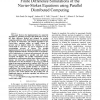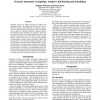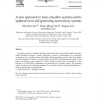850 search results - page 55 / 170 » Using Machine Learning to Guide Architecture Simulation |
150
click to vote
SBACPAD
2003
IEEE
15 years 7 months ago
2003
IEEE
This paper discusses the implementation of a numerical algorithm for simulating incompressible fluid flows based on the finite difference method and designed for parallel compu...
AAAI
2004
15 years 3 months ago
2004
Computer systems are rapidly becoming so complex that maintaining them with human support staffs will be prohibitively expensive and inefficient. In response, visionaries have beg...
126
click to vote
ML
2000
ACM
15 years 1 months ago
2000
ACM
We present an approach to inductive concept learning using multiple models for time series. Our objective is to improve the efficiency and accuracy of concept learning by decomposi...
116
click to vote
ISCA
2010
IEEE
15 years 7 months ago
2010
IEEE
Given the multicore microprocessor revolution, we argue that the architecture research community needs a dramatic increase in simulation capacity. We believe FPGA Architecture Mod...
120
click to vote
IJON
2006
15 years 2 months ago
2006
A classifier system is a machine learning system that learns syntactically simple string rules (called classifiers) through a genetic algorithm to guide its performance in an arbi...



